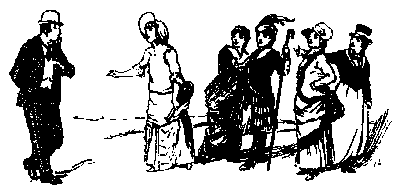Gilbert & Sullivan Opera
A History and a Comment
by H. M. Walbrook
CHAPTER VII.
BUNTHORNE's BRIDE.

Patience, or Bunthorne's Bride , was first produced at the Opéra Comique on April 23rd, 1881. As originally constructed the libretto was based on the Bab Ballad, "The Rival Curates," and the cavalry officers were to be shown as surrendering their commissions, and deciding to take orders, having been "cut out" by the superior attractions of two young clergymen. As he progressed, however, the author gradually realised that a chorus of comic clergymen would be regarded as an affront of popular taste, and he converted the curates into aesthetic poets and rearranged his details accordingly.
As we have it, the piece satirizes the "aesthetic craze" with which Oscar Wilde, irreverently, and William Morris and Edward Burne Jones respectfully, were associated in the popular imagination. George Du Maurier had long been pouring weekly sarcasm on the movement in the pages of Punch, and at the Prince of Wales' Theatre F. C. Burnand's threeact farce, The Colonel, had poked further fun at its eccentricities. Gilbert's satire, in fact, came a little late in the day. Mockery had already done its work, and by the spring of 1881 Maudle and Postlethwaite were vieux jeu. In spite of this, however, the opera was received with enthusiasm. Its bilious Bunthorne, allright Archibald, and rapturous maidens, were gratefully accepted as gifts from the very god of laughter; and its music was voted more beautiful than anything Sullivan had as yet contributed to the stage. Indeed, thirty years after, Gilbert attributed the maintained attractiveness of the opera as "mainly referable to the delightful music." No one can truthfully say that the aesthetic craze was entirely useless. If only as the unconscious inspirer of the pages of Patience it stands richly justified.
The story sets forth how two poets, Archibald Grosvenor and Reginald Bunthorne, become rivals for the hand of the village milkmaid and how in the end Grosvenor, by deciding to become a perfectly ordinary and commonplace young man, wins her hand, having already won her heart. The alternative title of the piece is Bunthorne's Bride, and it is characteristic of the author that in the end Bunthorne is the only man in the piece who is left brideless. The chorus of maidens bestow their love upon a variety of persons at a moment's notice and withdraw it as readily. When the curtain rises they are all sighing for Bunthorne. When Patience, the milkmaid, accepts that gentleman they all turn immediately, and with the utmost tenderness, to the officers and men of a company of Dragoon Guards who have just arrived in the village. When Grosvenor suddenly appears they instantaneously withdraw from the embracing arms of the warriors and fling themselves at his feet; and in the end they decide to drop their aestheticism, become "everyday young girls," and marry the soldiers.
The dialogue and lyrics are often of the richest farce. None of its hundreds of audiences can have listened without laughter to such talk as:
- ANGELA:
- Ah! Patience, if you have never loved, you have never known true happiness! (All sigh).
- PATIENCE:
- But the truly happy always seem to have so much on their mind. The truly happy never seem quite well.
- JANE:
- There is a transcendentality of delirium — acute accentuation of supremest ecstasy — which the earthy might easily mistake for indigestion. But it is not indigestion — it is aesthetic transfiguration!
or to Lady Jane's suggestions for the improvement of the uniform of the Dragoons:
. . . there is a cobwebby gray velvet, with a tender bloom like cold gravy, which, made Florentine fourteenth century, trimmed with Venetian leather and Spanish altar lace, and surmounted with something Japanese — it matters not what — would at least be Early English!
or to the scene between Grosvenor and Patience in which the poet describes the consequences of his having been "gifted with a beauty which probably has not its rival on earth" — or to the passage in which the same gentleman, after being followed about by the adoring maidens since Monday, asks for the "usual half-holiday" on Saturday, and entreats permission to be allowed to "close early today." The music is as rich. The sextette, "I hear the soft note," is one of Sullivan's loveliest inspirations, and the quintette, "If Saphir I choose to marry," one of his daintiest. The first entry of the Dragoons always takes place amid a peal of laughter; and the Colonel's song, "If you want a receipt for that popular mystery," is a masterpiece of verbal and musical patter.
The "Paddington Pollaky" alluded to by the Colonel was a celebrated detective of the day, a man of international reputation who, after his retirement lived at Brighton and was for some years an almost daily habitue of the public chessroom in the Royal Pavilion. He died during the Great War, Bunthorne's poems, "0 Hollow! Hollow! Hollow!" and "Heart Foam," are lampoons on the poetry of Oscar Wilde, in whose pages many lines as mannered and as meaningless may be found. The references to South Kensington are reminders that many of the lady art students at the Museum in that suburb were supposed to be devoted to the aesthetic cult. The "Monday Pops," of which Grosvenor sings, were the famous Monday evening "Popular Concerts" of chamber music held for more than thirty years in winter and spring in the old St. James's Hall in Piccadilly, under the direction of Mr. Chappell, of Bond Street , and at which Madame Schumann, Dr. Joachim and many of the leading performers in Europe were to be heard in the works of Beethoven and the other classic masters from Bach to Grieg. The line "A TuppennyTube young man," in the duet of the two bards, ran originally "A Threepenny 'Bus young man." Gilbert altered the line when the Tube came into vogue.
So far as Art, at any rate, is concerned, life was worth the living in those early days of Patience, when one could not only see that charming work any evening in the week, with all its glow as a new production and amid the excitement of crowded audiences and peals of surprised laughter and applause, but hear those enchanting concerts at St. James's Hall on Saturday afternoons and Monday evenings to which reference has been made; enjoy at Burlington House the latest new pictures of Leighton and Millais, Henry Moore and Hook; see Irving and Ellen Terry at the top of their powers at the Lyceum; or read any morning in the newspapers of a new poem by Tennyson, Browning, or Swinburne, or a new essay by Matthew Arnold.
